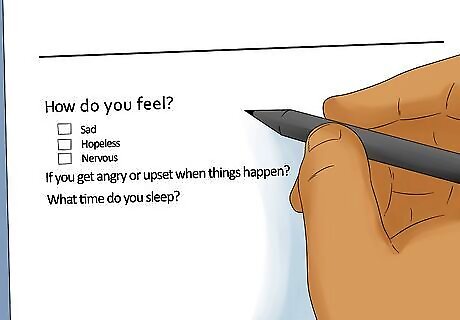
views
Undergoing Assessments and Tests

See a licensed mental health professional for assessment. General practitioners cannot perform psychiatric assessments or tests. You need to see a licensed mental health professional, such as a psychologist, psychiatrist, licensed social worker, licensed professional counselor (LPC), or licensed mental health counselor (LMHC). According to board-certified psychiatrist Padam Bhatia, "You'll have a better outcome in your treatment if you can find a mental health professional that you trust and feel comfortable with." You can get a referral to a mental health professional from your physician. You may also want to look up mental health professionals in your area. Your insurance company can help you locate a professional in your area that is covered by your insurance.

Undergo tests based on your symptoms. Psychological and psychiatric tests are similar to medical tests in that a doctor or mental health professional looks at your symptoms and orders a test to understand the underlying cause. These tests may check for certain character traits, developmental problems, emotional disorders, or physical problems. For example, if a child has difficulty in school, they may be tested for a learning disability. A person who feels down, lethargic, or like they can’t get out of bed may be tested for emotional disorders.

Answer a questionnaire or checklist. Many psychological tests are formal questionnaires and checklists that contain standardized questions. Generally, your answers are ranked and given a score. This score correlates to a potential psychological problem or underlying character trait. Board-certified psychiatrist Padam Bhatia advises "being very truthful in your answers. If you're engaged in the conversation with your psychiatrist, you're going to get a better outcome." These questionnaires generally ask about how you feel, like if you feel sad, hopeless, or nervous often. They also may ask about your emotional responses to things, like if you get angry or upset when things happen, and your sleeping patterns.

Provide any health-related information. During your assessment, the mental health professional may want to know more about your health. According to board-certified psychiatrist Padam Bhatia, "Be prepared to answer questions about different disorders, including major depressive disorder, bipolar disorder, schizophrenia, any sort of psychosis, anxiety disorders, suicidal/homicidal ideation, ADHD, and substance use disorders. Your psychiatrist may also ask you about your medical history, sex life, and any sexually-transmitted diseases you may have." Keep in mind that physical disorders or substance abuse may mimic psychiatric illnesses. For instance, if you have uncontrolled asthma, it may provoke your anxiety.
Talking with the Mental Health Professional

Undergo an interview. Many psychiatric assessments first require a clinical interview, which is where a mental health specialist talks to you. They will ask you about your concerns, why you think you need the assessment, and what is going on with you. They also may ask you about your family history. Based upon your interview, the mental health professional decides what further assessments may be necessary. The mental health professional will observe you closely, including both your body language and what you say.

Have the mental health professional interview those close to you. In addition to being interviewed, the mental health professional may request to interview people that you are close to. They may want to interview family members, friends, coworkers, or others you interact with. Interviewing of others requires your written consent. They cannot interview someone without your permission.

Be prepared to talk about your relationships. Another thing often discussed during a psychiatric assessment is your social life and relationships. This may include relationships with your family, partners, children, or friends. They may also ask about your interaction with people at work or in social settings. They may ask you about your social habits, like how often you date, where you go when you go out, and what kinds of social activities you engage in. You will also talk quite a bit about your childhood, including your family of origin and the dynamics of these relationships.

Share only what you feel comfortable sharing. Though it’s important to be open and honest during your assessment so you can get the right diagnosis, you may not be ready to talk about some things. That is okay. You can tell your mental health professional that you are not ready to discuss certain things, but be honest about what you can. If you need, you can bring a friend or family member with you to support you if you think you need it to discuss difficult things. It’s better to be vague and tell the truth than to lie. For instance, you can confirm that you experienced abuse as a child but decline to discuss it further. This is more ideal than refusing to answer the question or denying that anything occurred.
Determining Your Next Steps

Decide on a treatment plan. After being evaluated, you and your mental health professional will determine the best course of treatment. This may include psychotherapy, talk therapy, medication, or changing some of your circumstances. You have the right to give the doctor your input, and you also have the right to ask questions. You may be referred to multiple mental health professionals for treatment. If you need psychotherapy or talk therapy, you may go to a therapist, psychologist, or licensed social worker. If you need medication, it will be prescribed through a psychiatrist.

Get a second opinion if you are not satisfied. Not all mental health professionals and treatment centers are the same. You need to be able to trust the people who are treating you. If you’re not comfortable with the professional or the assessment, it’s perfectly okay to find another one. This is important treatment, and you need to feel comfortable.

Find a support system. If you have just been diagnosed with a mental illness and are beginning your treatment, you should find people in your life to provide support. This can be a scary and confusing time in your life, and you shouldn't do it alone. Choose people you can trust or count on to help you. Consider asking a trusted family member, friend, colleague, or neighbor. If you don't feel comfortable talking to anyone in your real life yet, find a therapist you can talk to. You can also find support groups in your area through the National Alliance on Mental Illness (NAMI) or at local treatment facilities.

Know that there's nothing wrong with you. Thinking that you need mental health care can make you feel like something is wrong or that you are broken. You may think that you're the only one who has this sickness, and that you will be considered strange and different. This is not true. You shouldn’t feel upset about needing help. Getting help is important so you that you can receive the treatment you need. Many common problems, such as depression, are made worse by the feeling of being alone. Many problems like this are very common, so you are not alone. People who have suffered the same problem can help you understand it and cope with it. 1 in 25 adults living in the United States experiences a severe mental illness that interferes with their ability to function. 1 in 6 adults in the United States takes some form of psychiatric medication.

Accept that there isn’t an instant cure. Treating mental illness can be a long and difficult journey. Recovery and progress take time. Sometimes you will feel worse before you feel better. This is due to the difficult process of psychotherapy and also the trial-and-error nature of psychopharmacology. Do your best to be patient, trust your treatment providers, commit to their treatment recommendations for an extended period of time, and let the process work.


















Comments
0 comment